Unilever's International Business Environment Analysis Report
VerifiedAdded on 2021/04/21
|15
|4311
|49
Report
AI Summary
This report provides an in-depth analysis of Unilever's international business operations, focusing on its success factors and the competitive landscape. The introduction highlights Unilever's history, product portfolio, market share, and global presence, emphasizing its position as a leading consumer goods company. The discussion section critically examines Unilever's international success through the lens of Porter's Diamond Model, exploring the firm's strategy, structure, rivalry, factor endowments (including skilled labor and natural resources), and demand conditions. The report assesses how these factors contribute to Unilever's national and international competitiveness, addressing topics such as the impact of domestic competition, cultural aspects, technological innovation, and consumer demand. The analysis includes examples from the UK and China, highlighting the significance of factor conditions and demand conditions in shaping Unilever's global strategy and competitive advantage. The report aims to provide insights into the company's ability to adapt to diverse market conditions and maintain its leadership in the fast-moving consumer goods (FMCG) industry. The report emphasizes the interconnectedness of these factors and their combined effect on Unilever's ability to achieve and sustain international success.
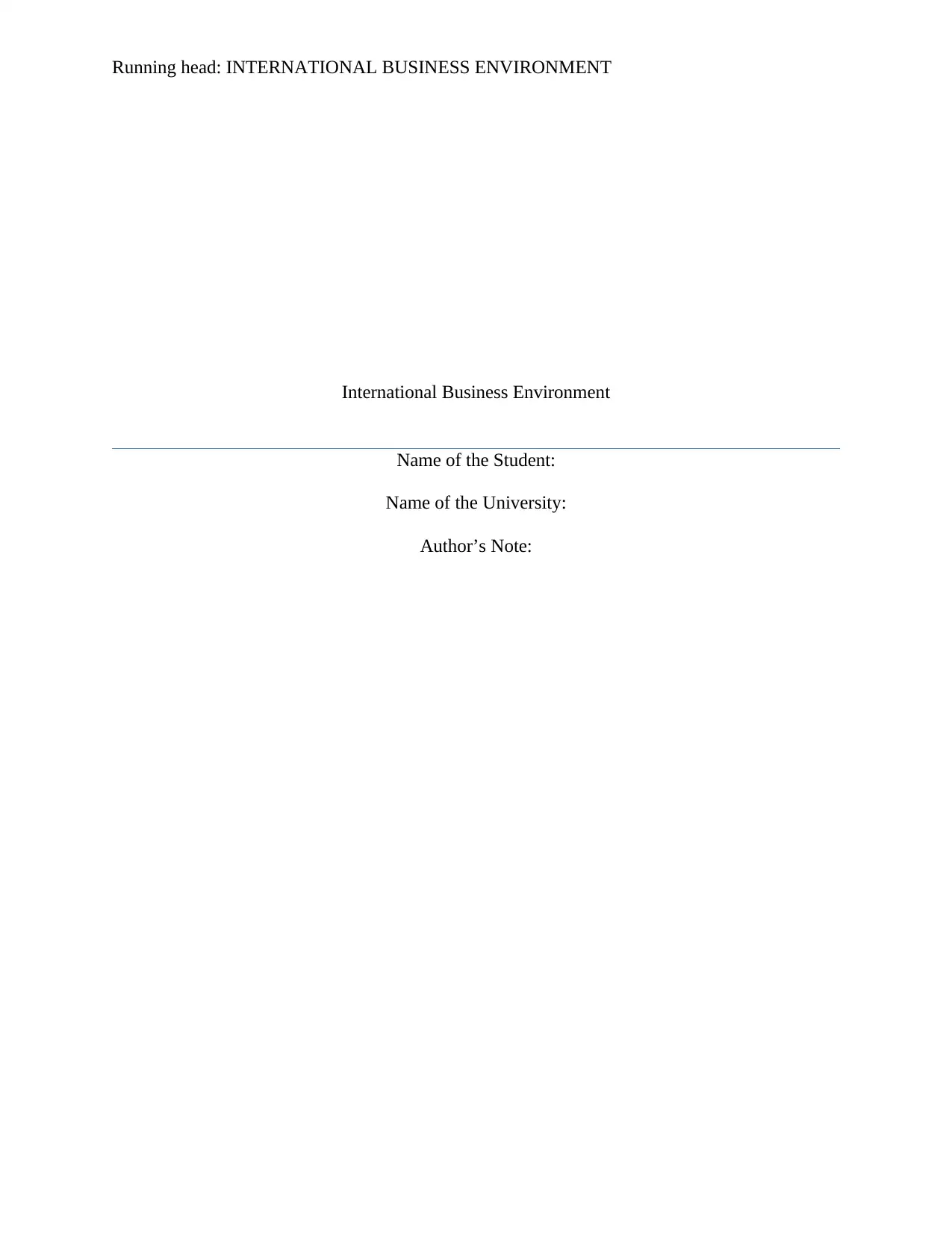
Running head: INTERNATIONAL BUSINESS ENVIRONMENT
International Business Environment
Name of the Student:
Name of the University:
Author’s Note:
International Business Environment
Name of the Student:
Name of the University:
Author’s Note:
Paraphrase This Document
Need a fresh take? Get an instant paraphrase of this document with our AI Paraphraser
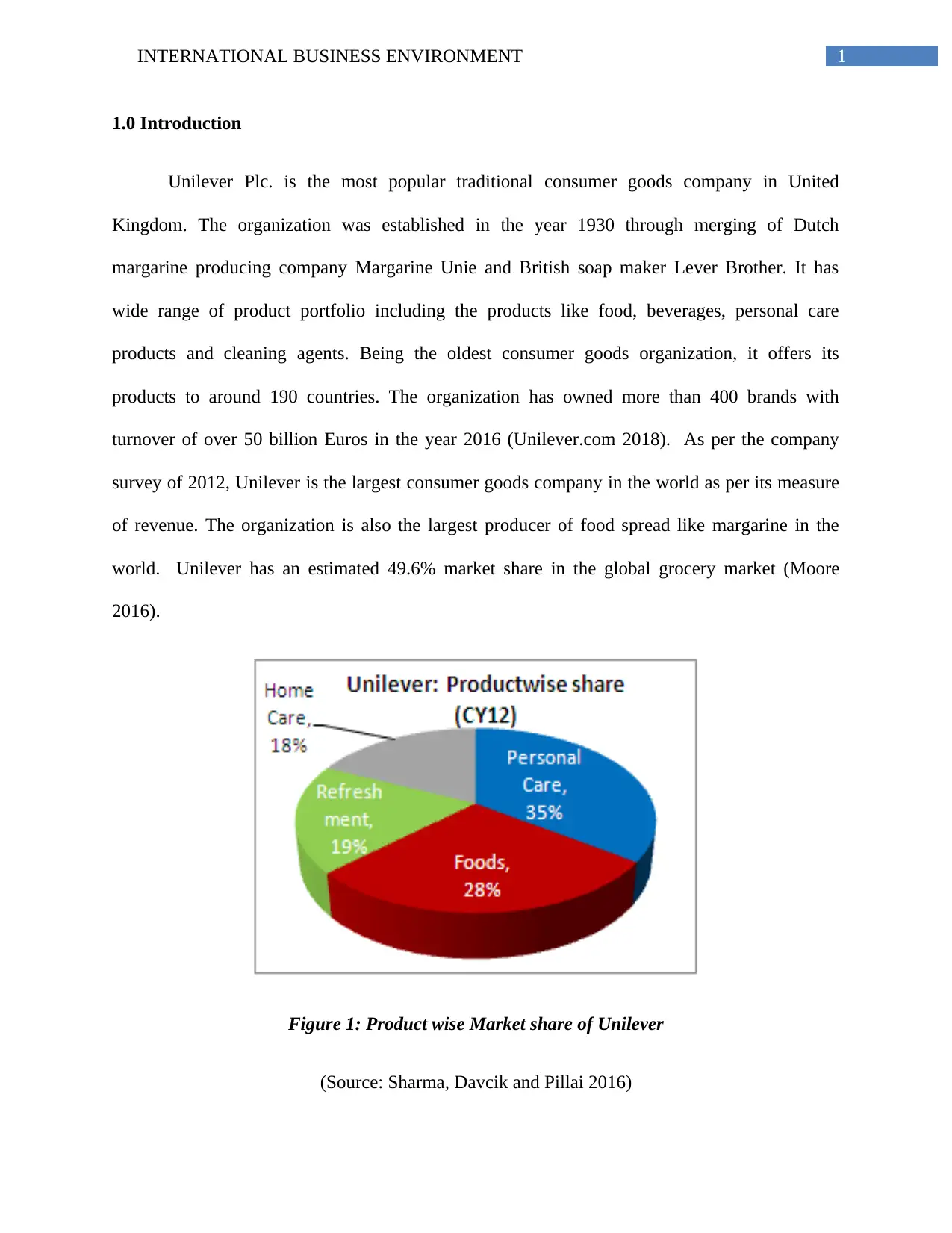
1INTERNATIONAL BUSINESS ENVIRONMENT
1.0 Introduction
Unilever Plc. is the most popular traditional consumer goods company in United
Kingdom. The organization was established in the year 1930 through merging of Dutch
margarine producing company Margarine Unie and British soap maker Lever Brother. It has
wide range of product portfolio including the products like food, beverages, personal care
products and cleaning agents. Being the oldest consumer goods organization, it offers its
products to around 190 countries. The organization has owned more than 400 brands with
turnover of over 50 billion Euros in the year 2016 (Unilever.com 2018). As per the company
survey of 2012, Unilever is the largest consumer goods company in the world as per its measure
of revenue. The organization is also the largest producer of food spread like margarine in the
world. Unilever has an estimated 49.6% market share in the global grocery market (Moore
2016).
Figure 1: Product wise Market share of Unilever
(Source: Sharma, Davcik and Pillai 2016)
1.0 Introduction
Unilever Plc. is the most popular traditional consumer goods company in United
Kingdom. The organization was established in the year 1930 through merging of Dutch
margarine producing company Margarine Unie and British soap maker Lever Brother. It has
wide range of product portfolio including the products like food, beverages, personal care
products and cleaning agents. Being the oldest consumer goods organization, it offers its
products to around 190 countries. The organization has owned more than 400 brands with
turnover of over 50 billion Euros in the year 2016 (Unilever.com 2018). As per the company
survey of 2012, Unilever is the largest consumer goods company in the world as per its measure
of revenue. The organization is also the largest producer of food spread like margarine in the
world. Unilever has an estimated 49.6% market share in the global grocery market (Moore
2016).
Figure 1: Product wise Market share of Unilever
(Source: Sharma, Davcik and Pillai 2016)
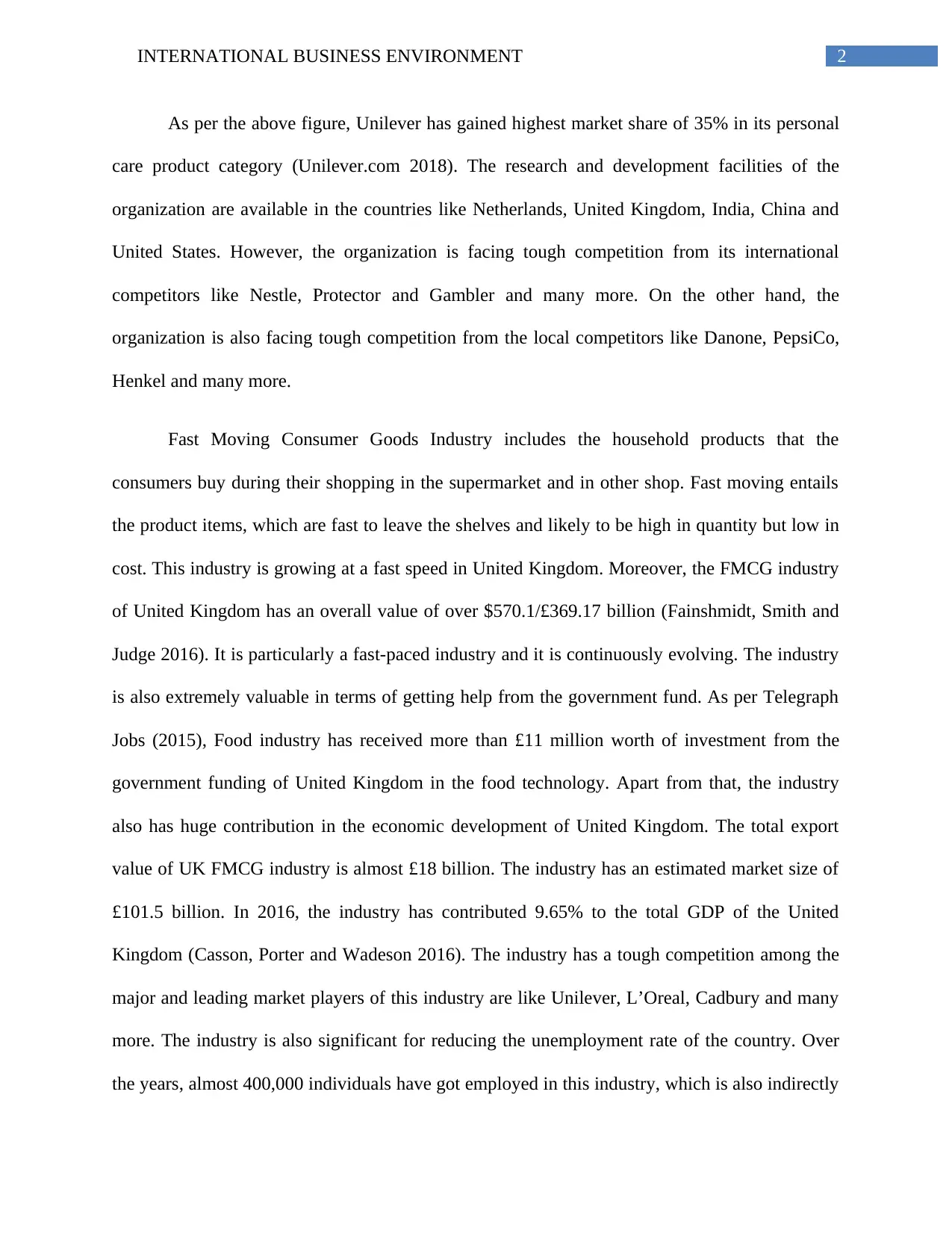
2INTERNATIONAL BUSINESS ENVIRONMENT
As per the above figure, Unilever has gained highest market share of 35% in its personal
care product category (Unilever.com 2018). The research and development facilities of the
organization are available in the countries like Netherlands, United Kingdom, India, China and
United States. However, the organization is facing tough competition from its international
competitors like Nestle, Protector and Gambler and many more. On the other hand, the
organization is also facing tough competition from the local competitors like Danone, PepsiCo,
Henkel and many more.
Fast Moving Consumer Goods Industry includes the household products that the
consumers buy during their shopping in the supermarket and in other shop. Fast moving entails
the product items, which are fast to leave the shelves and likely to be high in quantity but low in
cost. This industry is growing at a fast speed in United Kingdom. Moreover, the FMCG industry
of United Kingdom has an overall value of over $570.1/£369.17 billion (Fainshmidt, Smith and
Judge 2016). It is particularly a fast-paced industry and it is continuously evolving. The industry
is also extremely valuable in terms of getting help from the government fund. As per Telegraph
Jobs (2015), Food industry has received more than £11 million worth of investment from the
government funding of United Kingdom in the food technology. Apart from that, the industry
also has huge contribution in the economic development of United Kingdom. The total export
value of UK FMCG industry is almost £18 billion. The industry has an estimated market size of
£101.5 billion. In 2016, the industry has contributed 9.65% to the total GDP of the United
Kingdom (Casson, Porter and Wadeson 2016). The industry has a tough competition among the
major and leading market players of this industry are like Unilever, L’Oreal, Cadbury and many
more. The industry is also significant for reducing the unemployment rate of the country. Over
the years, almost 400,000 individuals have got employed in this industry, which is also indirectly
As per the above figure, Unilever has gained highest market share of 35% in its personal
care product category (Unilever.com 2018). The research and development facilities of the
organization are available in the countries like Netherlands, United Kingdom, India, China and
United States. However, the organization is facing tough competition from its international
competitors like Nestle, Protector and Gambler and many more. On the other hand, the
organization is also facing tough competition from the local competitors like Danone, PepsiCo,
Henkel and many more.
Fast Moving Consumer Goods Industry includes the household products that the
consumers buy during their shopping in the supermarket and in other shop. Fast moving entails
the product items, which are fast to leave the shelves and likely to be high in quantity but low in
cost. This industry is growing at a fast speed in United Kingdom. Moreover, the FMCG industry
of United Kingdom has an overall value of over $570.1/£369.17 billion (Fainshmidt, Smith and
Judge 2016). It is particularly a fast-paced industry and it is continuously evolving. The industry
is also extremely valuable in terms of getting help from the government fund. As per Telegraph
Jobs (2015), Food industry has received more than £11 million worth of investment from the
government funding of United Kingdom in the food technology. Apart from that, the industry
also has huge contribution in the economic development of United Kingdom. The total export
value of UK FMCG industry is almost £18 billion. The industry has an estimated market size of
£101.5 billion. In 2016, the industry has contributed 9.65% to the total GDP of the United
Kingdom (Casson, Porter and Wadeson 2016). The industry has a tough competition among the
major and leading market players of this industry are like Unilever, L’Oreal, Cadbury and many
more. The industry is also significant for reducing the unemployment rate of the country. Over
the years, almost 400,000 individuals have got employed in this industry, which is also indirectly
⊘ This is a preview!⊘
Do you want full access?
Subscribe today to unlock all pages.

Trusted by 1+ million students worldwide
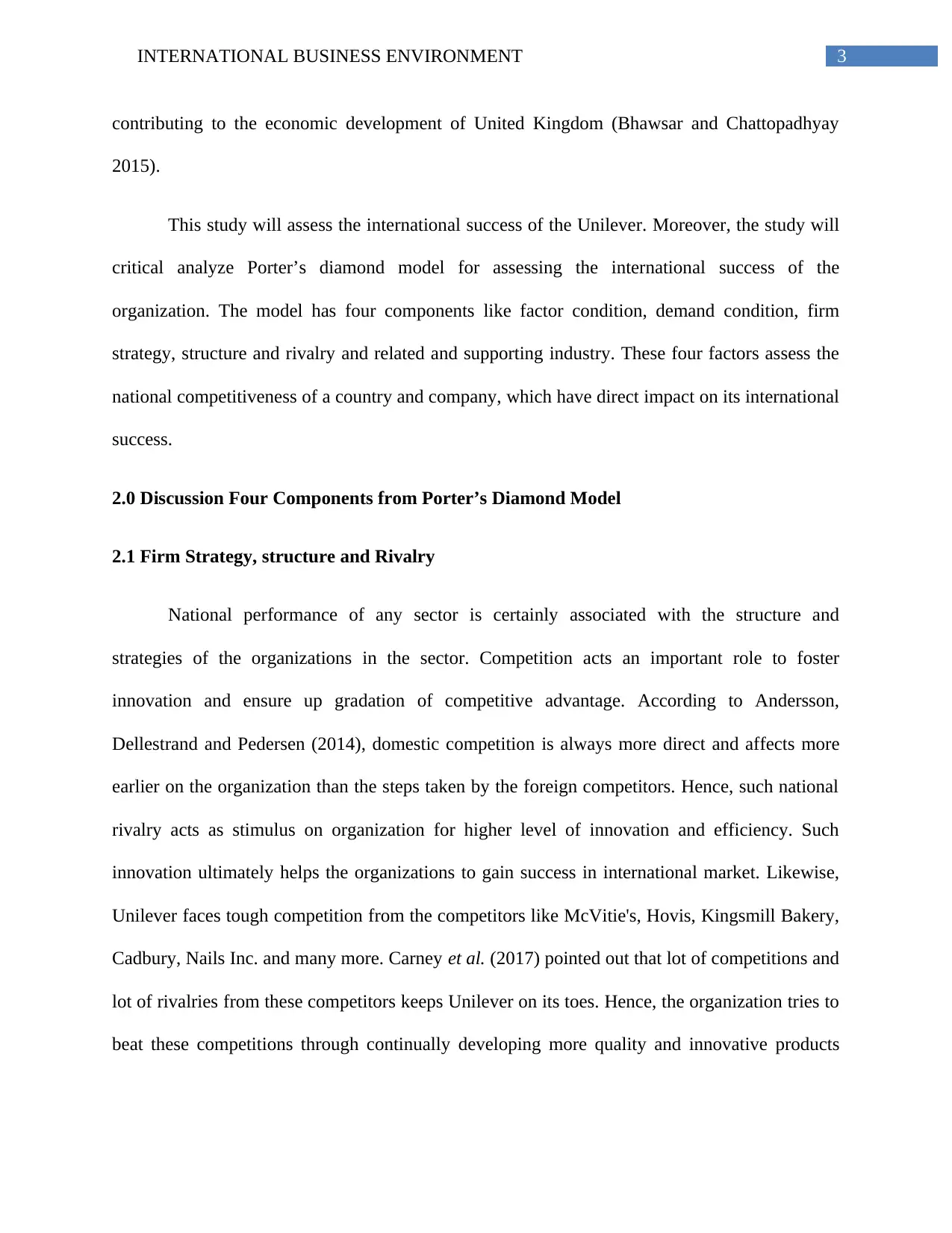
3INTERNATIONAL BUSINESS ENVIRONMENT
contributing to the economic development of United Kingdom (Bhawsar and Chattopadhyay
2015).
This study will assess the international success of the Unilever. Moreover, the study will
critical analyze Porter’s diamond model for assessing the international success of the
organization. The model has four components like factor condition, demand condition, firm
strategy, structure and rivalry and related and supporting industry. These four factors assess the
national competitiveness of a country and company, which have direct impact on its international
success.
2.0 Discussion Four Components from Porter’s Diamond Model
2.1 Firm Strategy, structure and Rivalry
National performance of any sector is certainly associated with the structure and
strategies of the organizations in the sector. Competition acts an important role to foster
innovation and ensure up gradation of competitive advantage. According to Andersson,
Dellestrand and Pedersen (2014), domestic competition is always more direct and affects more
earlier on the organization than the steps taken by the foreign competitors. Hence, such national
rivalry acts as stimulus on organization for higher level of innovation and efficiency. Such
innovation ultimately helps the organizations to gain success in international market. Likewise,
Unilever faces tough competition from the competitors like McVitie's, Hovis, Kingsmill Bakery,
Cadbury, Nails Inc. and many more. Carney et al. (2017) pointed out that lot of competitions and
lot of rivalries from these competitors keeps Unilever on its toes. Hence, the organization tries to
beat these competitions through continually developing more quality and innovative products
contributing to the economic development of United Kingdom (Bhawsar and Chattopadhyay
2015).
This study will assess the international success of the Unilever. Moreover, the study will
critical analyze Porter’s diamond model for assessing the international success of the
organization. The model has four components like factor condition, demand condition, firm
strategy, structure and rivalry and related and supporting industry. These four factors assess the
national competitiveness of a country and company, which have direct impact on its international
success.
2.0 Discussion Four Components from Porter’s Diamond Model
2.1 Firm Strategy, structure and Rivalry
National performance of any sector is certainly associated with the structure and
strategies of the organizations in the sector. Competition acts an important role to foster
innovation and ensure up gradation of competitive advantage. According to Andersson,
Dellestrand and Pedersen (2014), domestic competition is always more direct and affects more
earlier on the organization than the steps taken by the foreign competitors. Hence, such national
rivalry acts as stimulus on organization for higher level of innovation and efficiency. Such
innovation ultimately helps the organizations to gain success in international market. Likewise,
Unilever faces tough competition from the competitors like McVitie's, Hovis, Kingsmill Bakery,
Cadbury, Nails Inc. and many more. Carney et al. (2017) pointed out that lot of competitions and
lot of rivalries from these competitors keeps Unilever on its toes. Hence, the organization tries to
beat these competitions through continually developing more quality and innovative products
Paraphrase This Document
Need a fresh take? Get an instant paraphrase of this document with our AI Paraphraser
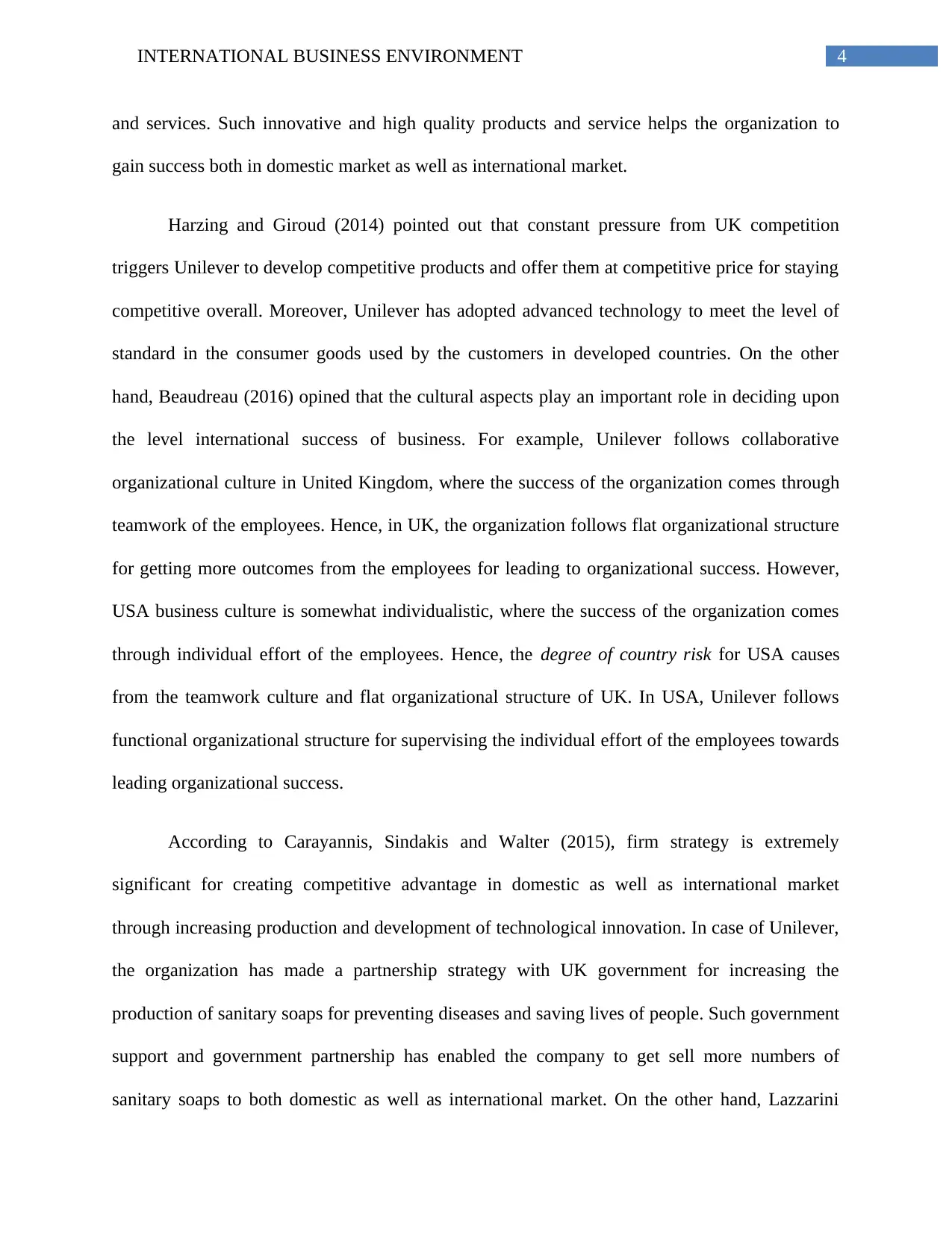
4INTERNATIONAL BUSINESS ENVIRONMENT
and services. Such innovative and high quality products and service helps the organization to
gain success both in domestic market as well as international market.
Harzing and Giroud (2014) pointed out that constant pressure from UK competition
triggers Unilever to develop competitive products and offer them at competitive price for staying
competitive overall. Moreover, Unilever has adopted advanced technology to meet the level of
standard in the consumer goods used by the customers in developed countries. On the other
hand, Beaudreau (2016) opined that the cultural aspects play an important role in deciding upon
the level international success of business. For example, Unilever follows collaborative
organizational culture in United Kingdom, where the success of the organization comes through
teamwork of the employees. Hence, in UK, the organization follows flat organizational structure
for getting more outcomes from the employees for leading to organizational success. However,
USA business culture is somewhat individualistic, where the success of the organization comes
through individual effort of the employees. Hence, the degree of country risk for USA causes
from the teamwork culture and flat organizational structure of UK. In USA, Unilever follows
functional organizational structure for supervising the individual effort of the employees towards
leading organizational success.
According to Carayannis, Sindakis and Walter (2015), firm strategy is extremely
significant for creating competitive advantage in domestic as well as international market
through increasing production and development of technological innovation. In case of Unilever,
the organization has made a partnership strategy with UK government for increasing the
production of sanitary soaps for preventing diseases and saving lives of people. Such government
support and government partnership has enabled the company to get sell more numbers of
sanitary soaps to both domestic as well as international market. On the other hand, Lazzarini
and services. Such innovative and high quality products and service helps the organization to
gain success both in domestic market as well as international market.
Harzing and Giroud (2014) pointed out that constant pressure from UK competition
triggers Unilever to develop competitive products and offer them at competitive price for staying
competitive overall. Moreover, Unilever has adopted advanced technology to meet the level of
standard in the consumer goods used by the customers in developed countries. On the other
hand, Beaudreau (2016) opined that the cultural aspects play an important role in deciding upon
the level international success of business. For example, Unilever follows collaborative
organizational culture in United Kingdom, where the success of the organization comes through
teamwork of the employees. Hence, in UK, the organization follows flat organizational structure
for getting more outcomes from the employees for leading to organizational success. However,
USA business culture is somewhat individualistic, where the success of the organization comes
through individual effort of the employees. Hence, the degree of country risk for USA causes
from the teamwork culture and flat organizational structure of UK. In USA, Unilever follows
functional organizational structure for supervising the individual effort of the employees towards
leading organizational success.
According to Carayannis, Sindakis and Walter (2015), firm strategy is extremely
significant for creating competitive advantage in domestic as well as international market
through increasing production and development of technological innovation. In case of Unilever,
the organization has made a partnership strategy with UK government for increasing the
production of sanitary soaps for preventing diseases and saving lives of people. Such government
support and government partnership has enabled the company to get sell more numbers of
sanitary soaps to both domestic as well as international market. On the other hand, Lazzarini
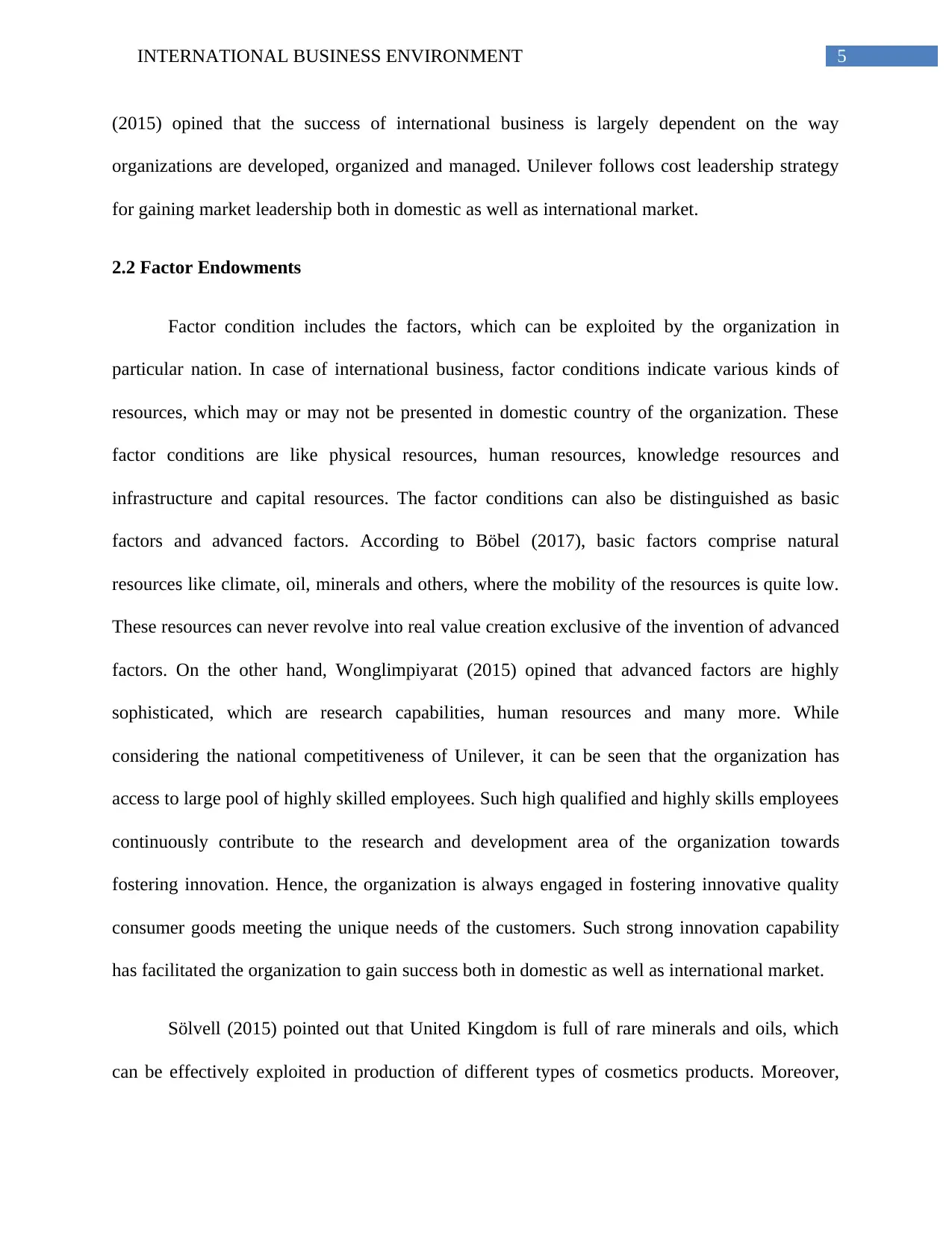
5INTERNATIONAL BUSINESS ENVIRONMENT
(2015) opined that the success of international business is largely dependent on the way
organizations are developed, organized and managed. Unilever follows cost leadership strategy
for gaining market leadership both in domestic as well as international market.
2.2 Factor Endowments
Factor condition includes the factors, which can be exploited by the organization in
particular nation. In case of international business, factor conditions indicate various kinds of
resources, which may or may not be presented in domestic country of the organization. These
factor conditions are like physical resources, human resources, knowledge resources and
infrastructure and capital resources. The factor conditions can also be distinguished as basic
factors and advanced factors. According to Böbel (2017), basic factors comprise natural
resources like climate, oil, minerals and others, where the mobility of the resources is quite low.
These resources can never revolve into real value creation exclusive of the invention of advanced
factors. On the other hand, Wonglimpiyarat (2015) opined that advanced factors are highly
sophisticated, which are research capabilities, human resources and many more. While
considering the national competitiveness of Unilever, it can be seen that the organization has
access to large pool of highly skilled employees. Such high qualified and highly skills employees
continuously contribute to the research and development area of the organization towards
fostering innovation. Hence, the organization is always engaged in fostering innovative quality
consumer goods meeting the unique needs of the customers. Such strong innovation capability
has facilitated the organization to gain success both in domestic as well as international market.
Sölvell (2015) pointed out that United Kingdom is full of rare minerals and oils, which
can be effectively exploited in production of different types of cosmetics products. Moreover,
(2015) opined that the success of international business is largely dependent on the way
organizations are developed, organized and managed. Unilever follows cost leadership strategy
for gaining market leadership both in domestic as well as international market.
2.2 Factor Endowments
Factor condition includes the factors, which can be exploited by the organization in
particular nation. In case of international business, factor conditions indicate various kinds of
resources, which may or may not be presented in domestic country of the organization. These
factor conditions are like physical resources, human resources, knowledge resources and
infrastructure and capital resources. The factor conditions can also be distinguished as basic
factors and advanced factors. According to Böbel (2017), basic factors comprise natural
resources like climate, oil, minerals and others, where the mobility of the resources is quite low.
These resources can never revolve into real value creation exclusive of the invention of advanced
factors. On the other hand, Wonglimpiyarat (2015) opined that advanced factors are highly
sophisticated, which are research capabilities, human resources and many more. While
considering the national competitiveness of Unilever, it can be seen that the organization has
access to large pool of highly skilled employees. Such high qualified and highly skills employees
continuously contribute to the research and development area of the organization towards
fostering innovation. Hence, the organization is always engaged in fostering innovative quality
consumer goods meeting the unique needs of the customers. Such strong innovation capability
has facilitated the organization to gain success both in domestic as well as international market.
Sölvell (2015) pointed out that United Kingdom is full of rare minerals and oils, which
can be effectively exploited in production of different types of cosmetics products. Moreover,
⊘ This is a preview!⊘
Do you want full access?
Subscribe today to unlock all pages.

Trusted by 1+ million students worldwide
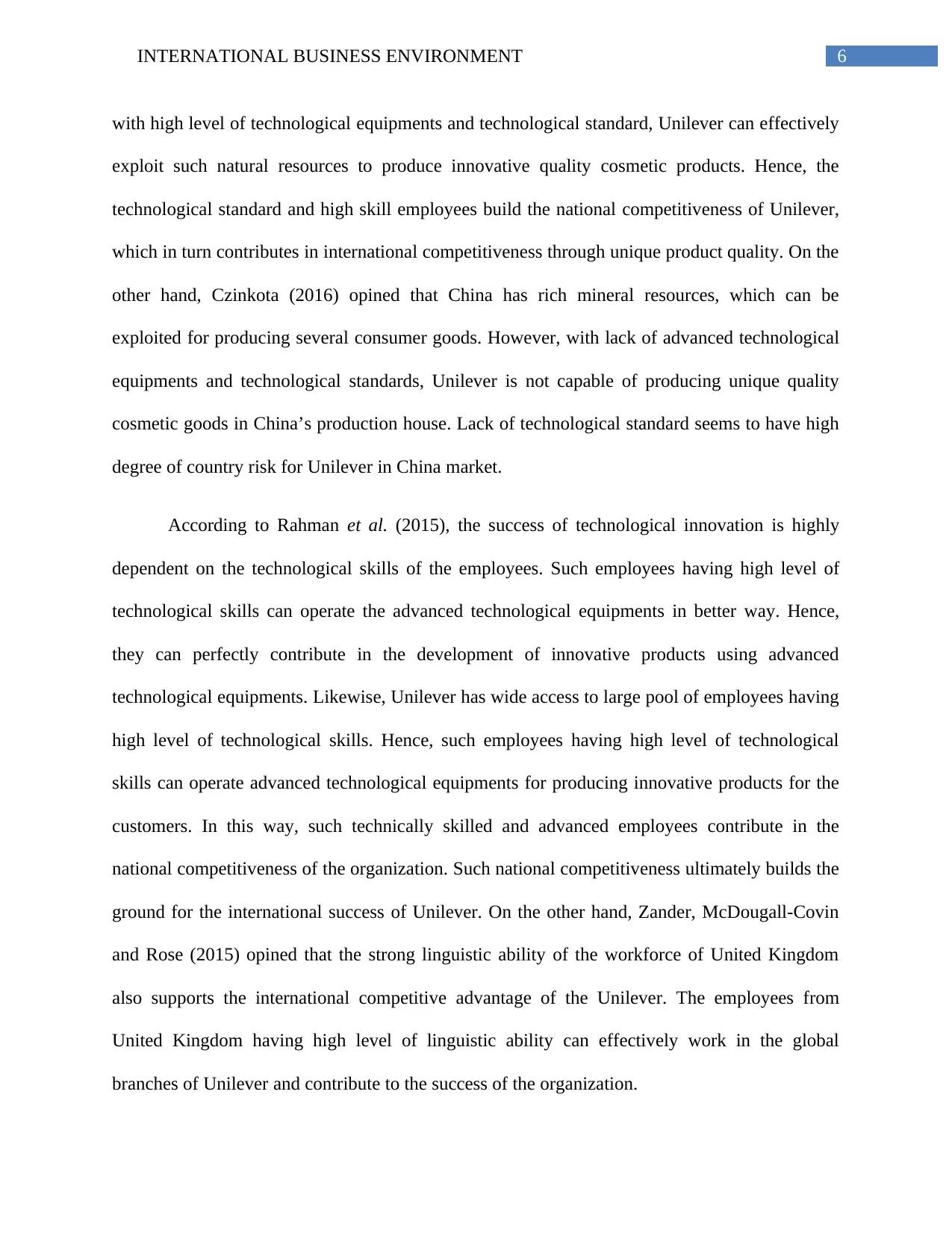
6INTERNATIONAL BUSINESS ENVIRONMENT
with high level of technological equipments and technological standard, Unilever can effectively
exploit such natural resources to produce innovative quality cosmetic products. Hence, the
technological standard and high skill employees build the national competitiveness of Unilever,
which in turn contributes in international competitiveness through unique product quality. On the
other hand, Czinkota (2016) opined that China has rich mineral resources, which can be
exploited for producing several consumer goods. However, with lack of advanced technological
equipments and technological standards, Unilever is not capable of producing unique quality
cosmetic goods in China’s production house. Lack of technological standard seems to have high
degree of country risk for Unilever in China market.
According to Rahman et al. (2015), the success of technological innovation is highly
dependent on the technological skills of the employees. Such employees having high level of
technological skills can operate the advanced technological equipments in better way. Hence,
they can perfectly contribute in the development of innovative products using advanced
technological equipments. Likewise, Unilever has wide access to large pool of employees having
high level of technological skills. Hence, such employees having high level of technological
skills can operate advanced technological equipments for producing innovative products for the
customers. In this way, such technically skilled and advanced employees contribute in the
national competitiveness of the organization. Such national competitiveness ultimately builds the
ground for the international success of Unilever. On the other hand, Zander, McDougall-Covin
and Rose (2015) opined that the strong linguistic ability of the workforce of United Kingdom
also supports the international competitive advantage of the Unilever. The employees from
United Kingdom having high level of linguistic ability can effectively work in the global
branches of Unilever and contribute to the success of the organization.
with high level of technological equipments and technological standard, Unilever can effectively
exploit such natural resources to produce innovative quality cosmetic products. Hence, the
technological standard and high skill employees build the national competitiveness of Unilever,
which in turn contributes in international competitiveness through unique product quality. On the
other hand, Czinkota (2016) opined that China has rich mineral resources, which can be
exploited for producing several consumer goods. However, with lack of advanced technological
equipments and technological standards, Unilever is not capable of producing unique quality
cosmetic goods in China’s production house. Lack of technological standard seems to have high
degree of country risk for Unilever in China market.
According to Rahman et al. (2015), the success of technological innovation is highly
dependent on the technological skills of the employees. Such employees having high level of
technological skills can operate the advanced technological equipments in better way. Hence,
they can perfectly contribute in the development of innovative products using advanced
technological equipments. Likewise, Unilever has wide access to large pool of employees having
high level of technological skills. Hence, such employees having high level of technological
skills can operate advanced technological equipments for producing innovative products for the
customers. In this way, such technically skilled and advanced employees contribute in the
national competitiveness of the organization. Such national competitiveness ultimately builds the
ground for the international success of Unilever. On the other hand, Zander, McDougall-Covin
and Rose (2015) opined that the strong linguistic ability of the workforce of United Kingdom
also supports the international competitive advantage of the Unilever. The employees from
United Kingdom having high level of linguistic ability can effectively work in the global
branches of Unilever and contribute to the success of the organization.
Paraphrase This Document
Need a fresh take? Get an instant paraphrase of this document with our AI Paraphraser
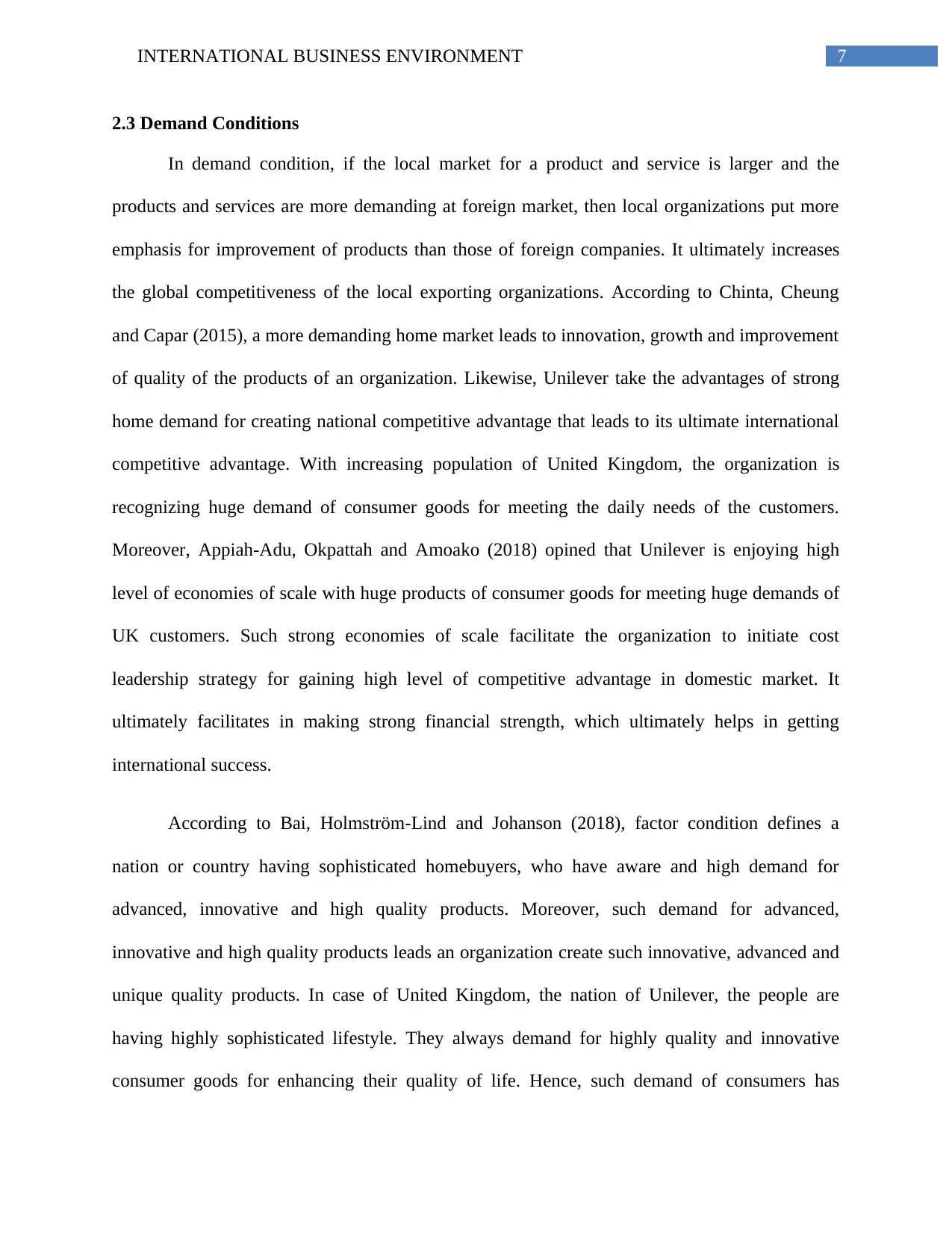
7INTERNATIONAL BUSINESS ENVIRONMENT
2.3 Demand Conditions
In demand condition, if the local market for a product and service is larger and the
products and services are more demanding at foreign market, then local organizations put more
emphasis for improvement of products than those of foreign companies. It ultimately increases
the global competitiveness of the local exporting organizations. According to Chinta, Cheung
and Capar (2015), a more demanding home market leads to innovation, growth and improvement
of quality of the products of an organization. Likewise, Unilever take the advantages of strong
home demand for creating national competitive advantage that leads to its ultimate international
competitive advantage. With increasing population of United Kingdom, the organization is
recognizing huge demand of consumer goods for meeting the daily needs of the customers.
Moreover, Appiah-Adu, Okpattah and Amoako (2018) opined that Unilever is enjoying high
level of economies of scale with huge products of consumer goods for meeting huge demands of
UK customers. Such strong economies of scale facilitate the organization to initiate cost
leadership strategy for gaining high level of competitive advantage in domestic market. It
ultimately facilitates in making strong financial strength, which ultimately helps in getting
international success.
According to Bai, Holmström-Lind and Johanson (2018), factor condition defines a
nation or country having sophisticated homebuyers, who have aware and high demand for
advanced, innovative and high quality products. Moreover, such demand for advanced,
innovative and high quality products leads an organization create such innovative, advanced and
unique quality products. In case of United Kingdom, the nation of Unilever, the people are
having highly sophisticated lifestyle. They always demand for highly quality and innovative
consumer goods for enhancing their quality of life. Hence, such demand of consumers has
2.3 Demand Conditions
In demand condition, if the local market for a product and service is larger and the
products and services are more demanding at foreign market, then local organizations put more
emphasis for improvement of products than those of foreign companies. It ultimately increases
the global competitiveness of the local exporting organizations. According to Chinta, Cheung
and Capar (2015), a more demanding home market leads to innovation, growth and improvement
of quality of the products of an organization. Likewise, Unilever take the advantages of strong
home demand for creating national competitive advantage that leads to its ultimate international
competitive advantage. With increasing population of United Kingdom, the organization is
recognizing huge demand of consumer goods for meeting the daily needs of the customers.
Moreover, Appiah-Adu, Okpattah and Amoako (2018) opined that Unilever is enjoying high
level of economies of scale with huge products of consumer goods for meeting huge demands of
UK customers. Such strong economies of scale facilitate the organization to initiate cost
leadership strategy for gaining high level of competitive advantage in domestic market. It
ultimately facilitates in making strong financial strength, which ultimately helps in getting
international success.
According to Bai, Holmström-Lind and Johanson (2018), factor condition defines a
nation or country having sophisticated homebuyers, who have aware and high demand for
advanced, innovative and high quality products. Moreover, such demand for advanced,
innovative and high quality products leads an organization create such innovative, advanced and
unique quality products. In case of United Kingdom, the nation of Unilever, the people are
having highly sophisticated lifestyle. They always demand for highly quality and innovative
consumer goods for enhancing their quality of life. Hence, such demand of consumers has
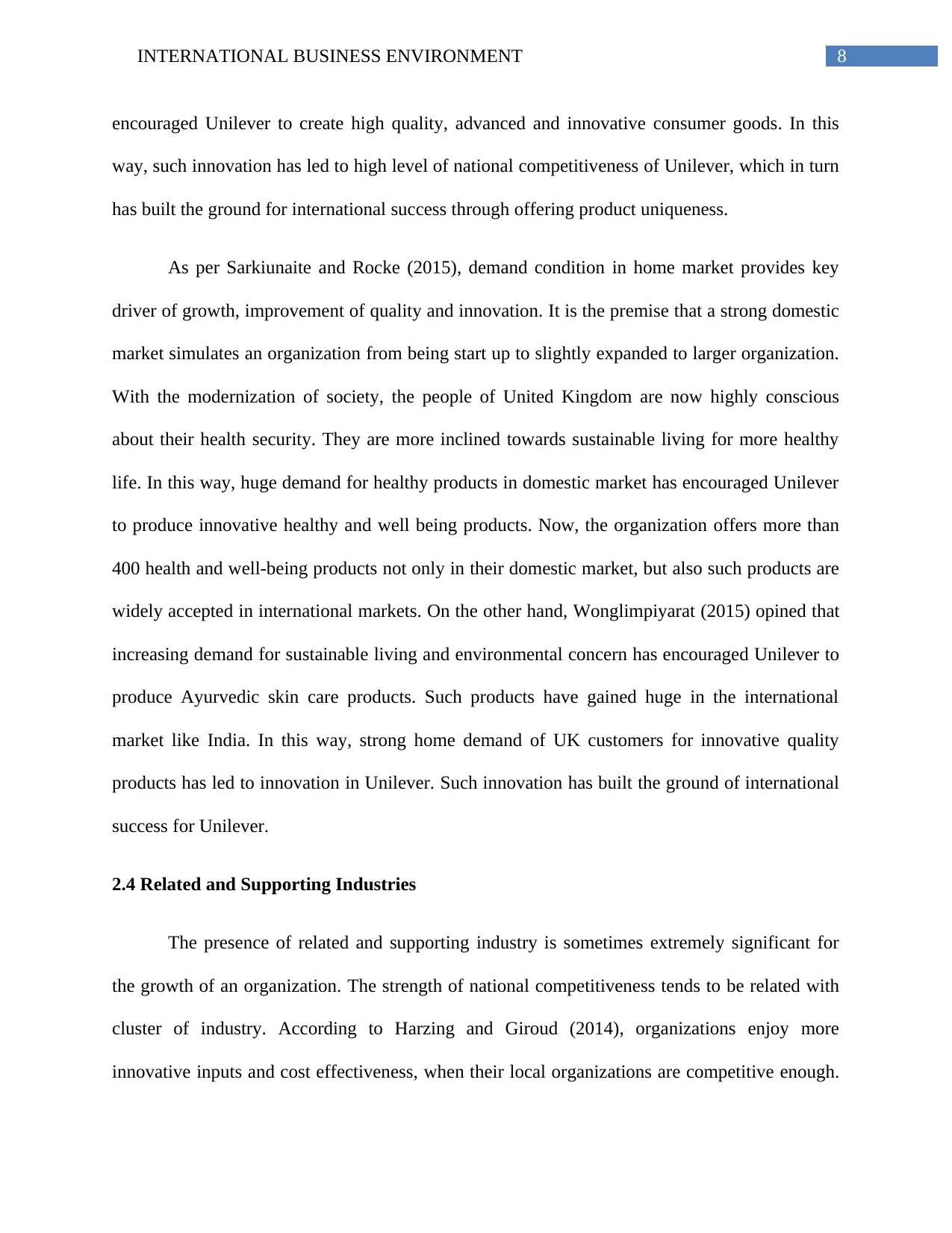
8INTERNATIONAL BUSINESS ENVIRONMENT
encouraged Unilever to create high quality, advanced and innovative consumer goods. In this
way, such innovation has led to high level of national competitiveness of Unilever, which in turn
has built the ground for international success through offering product uniqueness.
As per Sarkiunaite and Rocke (2015), demand condition in home market provides key
driver of growth, improvement of quality and innovation. It is the premise that a strong domestic
market simulates an organization from being start up to slightly expanded to larger organization.
With the modernization of society, the people of United Kingdom are now highly conscious
about their health security. They are more inclined towards sustainable living for more healthy
life. In this way, huge demand for healthy products in domestic market has encouraged Unilever
to produce innovative healthy and well being products. Now, the organization offers more than
400 health and well-being products not only in their domestic market, but also such products are
widely accepted in international markets. On the other hand, Wonglimpiyarat (2015) opined that
increasing demand for sustainable living and environmental concern has encouraged Unilever to
produce Ayurvedic skin care products. Such products have gained huge in the international
market like India. In this way, strong home demand of UK customers for innovative quality
products has led to innovation in Unilever. Such innovation has built the ground of international
success for Unilever.
2.4 Related and Supporting Industries
The presence of related and supporting industry is sometimes extremely significant for
the growth of an organization. The strength of national competitiveness tends to be related with
cluster of industry. According to Harzing and Giroud (2014), organizations enjoy more
innovative inputs and cost effectiveness, when their local organizations are competitive enough.
encouraged Unilever to create high quality, advanced and innovative consumer goods. In this
way, such innovation has led to high level of national competitiveness of Unilever, which in turn
has built the ground for international success through offering product uniqueness.
As per Sarkiunaite and Rocke (2015), demand condition in home market provides key
driver of growth, improvement of quality and innovation. It is the premise that a strong domestic
market simulates an organization from being start up to slightly expanded to larger organization.
With the modernization of society, the people of United Kingdom are now highly conscious
about their health security. They are more inclined towards sustainable living for more healthy
life. In this way, huge demand for healthy products in domestic market has encouraged Unilever
to produce innovative healthy and well being products. Now, the organization offers more than
400 health and well-being products not only in their domestic market, but also such products are
widely accepted in international markets. On the other hand, Wonglimpiyarat (2015) opined that
increasing demand for sustainable living and environmental concern has encouraged Unilever to
produce Ayurvedic skin care products. Such products have gained huge in the international
market like India. In this way, strong home demand of UK customers for innovative quality
products has led to innovation in Unilever. Such innovation has built the ground of international
success for Unilever.
2.4 Related and Supporting Industries
The presence of related and supporting industry is sometimes extremely significant for
the growth of an organization. The strength of national competitiveness tends to be related with
cluster of industry. According to Harzing and Giroud (2014), organizations enjoy more
innovative inputs and cost effectiveness, when their local organizations are competitive enough.
⊘ This is a preview!⊘
Do you want full access?
Subscribe today to unlock all pages.

Trusted by 1+ million students worldwide
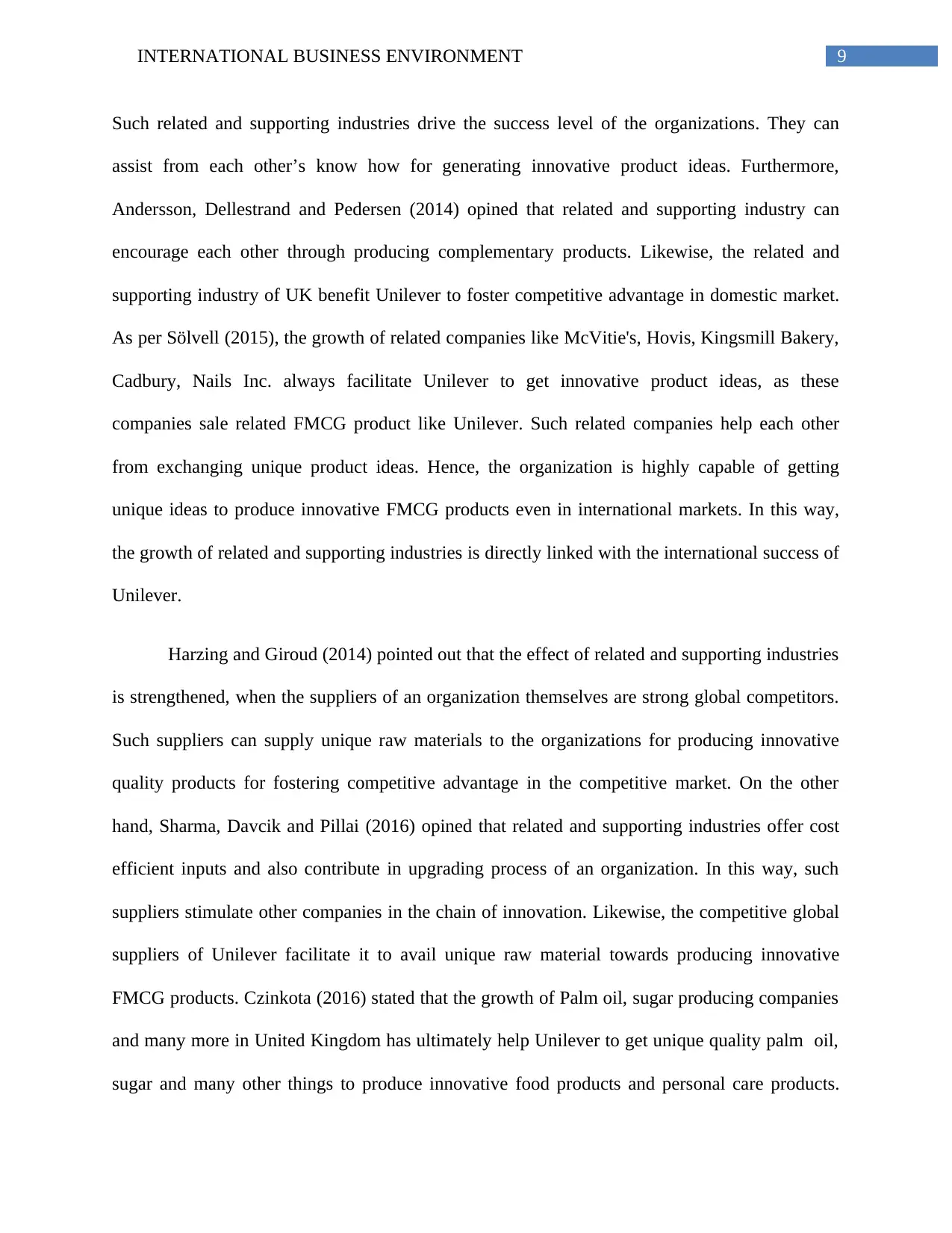
9INTERNATIONAL BUSINESS ENVIRONMENT
Such related and supporting industries drive the success level of the organizations. They can
assist from each other’s know how for generating innovative product ideas. Furthermore,
Andersson, Dellestrand and Pedersen (2014) opined that related and supporting industry can
encourage each other through producing complementary products. Likewise, the related and
supporting industry of UK benefit Unilever to foster competitive advantage in domestic market.
As per Sölvell (2015), the growth of related companies like McVitie's, Hovis, Kingsmill Bakery,
Cadbury, Nails Inc. always facilitate Unilever to get innovative product ideas, as these
companies sale related FMCG product like Unilever. Such related companies help each other
from exchanging unique product ideas. Hence, the organization is highly capable of getting
unique ideas to produce innovative FMCG products even in international markets. In this way,
the growth of related and supporting industries is directly linked with the international success of
Unilever.
Harzing and Giroud (2014) pointed out that the effect of related and supporting industries
is strengthened, when the suppliers of an organization themselves are strong global competitors.
Such suppliers can supply unique raw materials to the organizations for producing innovative
quality products for fostering competitive advantage in the competitive market. On the other
hand, Sharma, Davcik and Pillai (2016) opined that related and supporting industries offer cost
efficient inputs and also contribute in upgrading process of an organization. In this way, such
suppliers stimulate other companies in the chain of innovation. Likewise, the competitive global
suppliers of Unilever facilitate it to avail unique raw material towards producing innovative
FMCG products. Czinkota (2016) stated that the growth of Palm oil, sugar producing companies
and many more in United Kingdom has ultimately help Unilever to get unique quality palm oil,
sugar and many other things to produce innovative food products and personal care products.
Such related and supporting industries drive the success level of the organizations. They can
assist from each other’s know how for generating innovative product ideas. Furthermore,
Andersson, Dellestrand and Pedersen (2014) opined that related and supporting industry can
encourage each other through producing complementary products. Likewise, the related and
supporting industry of UK benefit Unilever to foster competitive advantage in domestic market.
As per Sölvell (2015), the growth of related companies like McVitie's, Hovis, Kingsmill Bakery,
Cadbury, Nails Inc. always facilitate Unilever to get innovative product ideas, as these
companies sale related FMCG product like Unilever. Such related companies help each other
from exchanging unique product ideas. Hence, the organization is highly capable of getting
unique ideas to produce innovative FMCG products even in international markets. In this way,
the growth of related and supporting industries is directly linked with the international success of
Unilever.
Harzing and Giroud (2014) pointed out that the effect of related and supporting industries
is strengthened, when the suppliers of an organization themselves are strong global competitors.
Such suppliers can supply unique raw materials to the organizations for producing innovative
quality products for fostering competitive advantage in the competitive market. On the other
hand, Sharma, Davcik and Pillai (2016) opined that related and supporting industries offer cost
efficient inputs and also contribute in upgrading process of an organization. In this way, such
suppliers stimulate other companies in the chain of innovation. Likewise, the competitive global
suppliers of Unilever facilitate it to avail unique raw material towards producing innovative
FMCG products. Czinkota (2016) stated that the growth of Palm oil, sugar producing companies
and many more in United Kingdom has ultimately help Unilever to get unique quality palm oil,
sugar and many other things to produce innovative food products and personal care products.
Paraphrase This Document
Need a fresh take? Get an instant paraphrase of this document with our AI Paraphraser
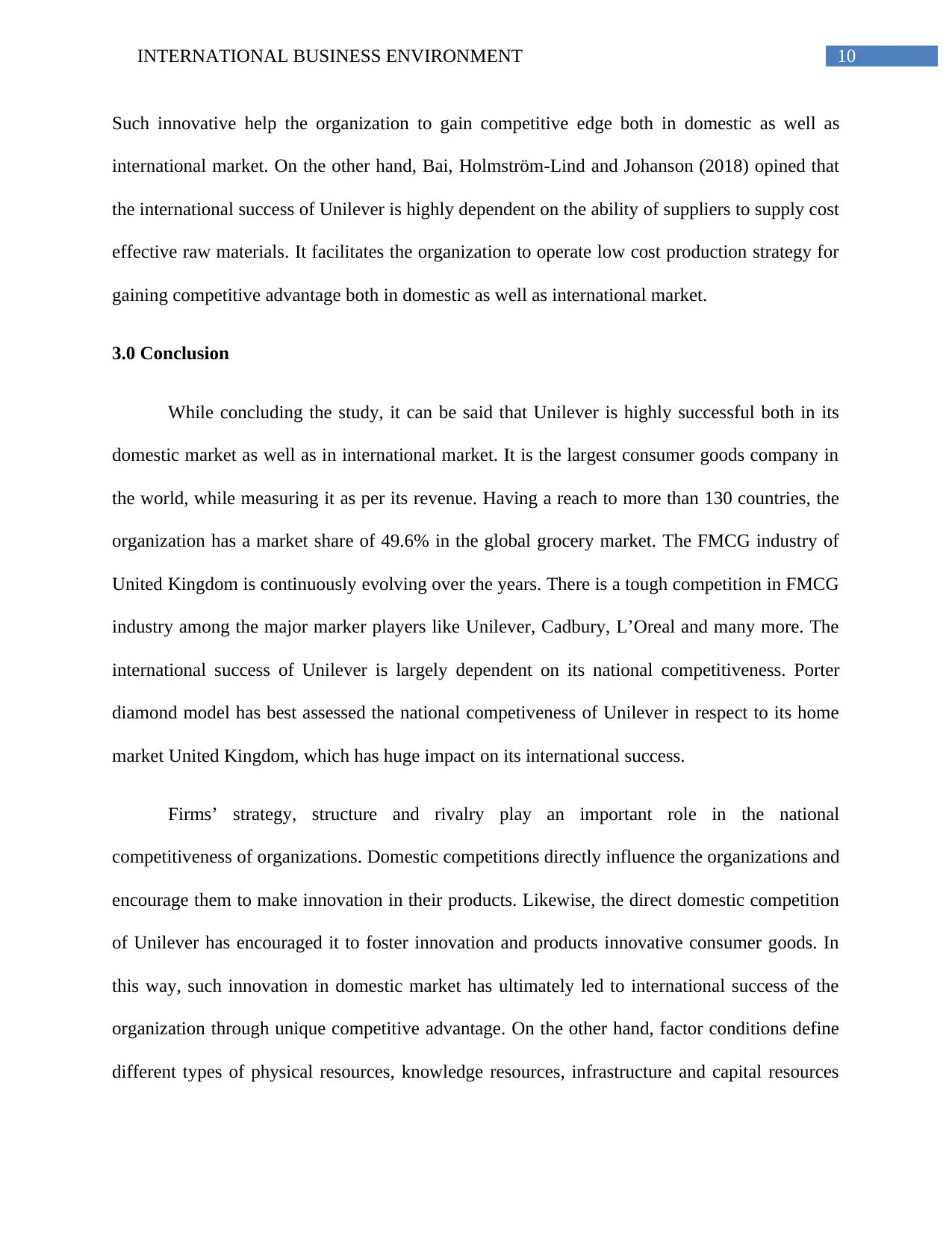
10INTERNATIONAL BUSINESS ENVIRONMENT
Such innovative help the organization to gain competitive edge both in domestic as well as
international market. On the other hand, Bai, Holmström-Lind and Johanson (2018) opined that
the international success of Unilever is highly dependent on the ability of suppliers to supply cost
effective raw materials. It facilitates the organization to operate low cost production strategy for
gaining competitive advantage both in domestic as well as international market.
3.0 Conclusion
While concluding the study, it can be said that Unilever is highly successful both in its
domestic market as well as in international market. It is the largest consumer goods company in
the world, while measuring it as per its revenue. Having a reach to more than 130 countries, the
organization has a market share of 49.6% in the global grocery market. The FMCG industry of
United Kingdom is continuously evolving over the years. There is a tough competition in FMCG
industry among the major marker players like Unilever, Cadbury, L’Oreal and many more. The
international success of Unilever is largely dependent on its national competitiveness. Porter
diamond model has best assessed the national competiveness of Unilever in respect to its home
market United Kingdom, which has huge impact on its international success.
Firms’ strategy, structure and rivalry play an important role in the national
competitiveness of organizations. Domestic competitions directly influence the organizations and
encourage them to make innovation in their products. Likewise, the direct domestic competition
of Unilever has encouraged it to foster innovation and products innovative consumer goods. In
this way, such innovation in domestic market has ultimately led to international success of the
organization through unique competitive advantage. On the other hand, factor conditions define
different types of physical resources, knowledge resources, infrastructure and capital resources
Such innovative help the organization to gain competitive edge both in domestic as well as
international market. On the other hand, Bai, Holmström-Lind and Johanson (2018) opined that
the international success of Unilever is highly dependent on the ability of suppliers to supply cost
effective raw materials. It facilitates the organization to operate low cost production strategy for
gaining competitive advantage both in domestic as well as international market.
3.0 Conclusion
While concluding the study, it can be said that Unilever is highly successful both in its
domestic market as well as in international market. It is the largest consumer goods company in
the world, while measuring it as per its revenue. Having a reach to more than 130 countries, the
organization has a market share of 49.6% in the global grocery market. The FMCG industry of
United Kingdom is continuously evolving over the years. There is a tough competition in FMCG
industry among the major marker players like Unilever, Cadbury, L’Oreal and many more. The
international success of Unilever is largely dependent on its national competitiveness. Porter
diamond model has best assessed the national competiveness of Unilever in respect to its home
market United Kingdom, which has huge impact on its international success.
Firms’ strategy, structure and rivalry play an important role in the national
competitiveness of organizations. Domestic competitions directly influence the organizations and
encourage them to make innovation in their products. Likewise, the direct domestic competition
of Unilever has encouraged it to foster innovation and products innovative consumer goods. In
this way, such innovation in domestic market has ultimately led to international success of the
organization through unique competitive advantage. On the other hand, factor conditions define
different types of physical resources, knowledge resources, infrastructure and capital resources
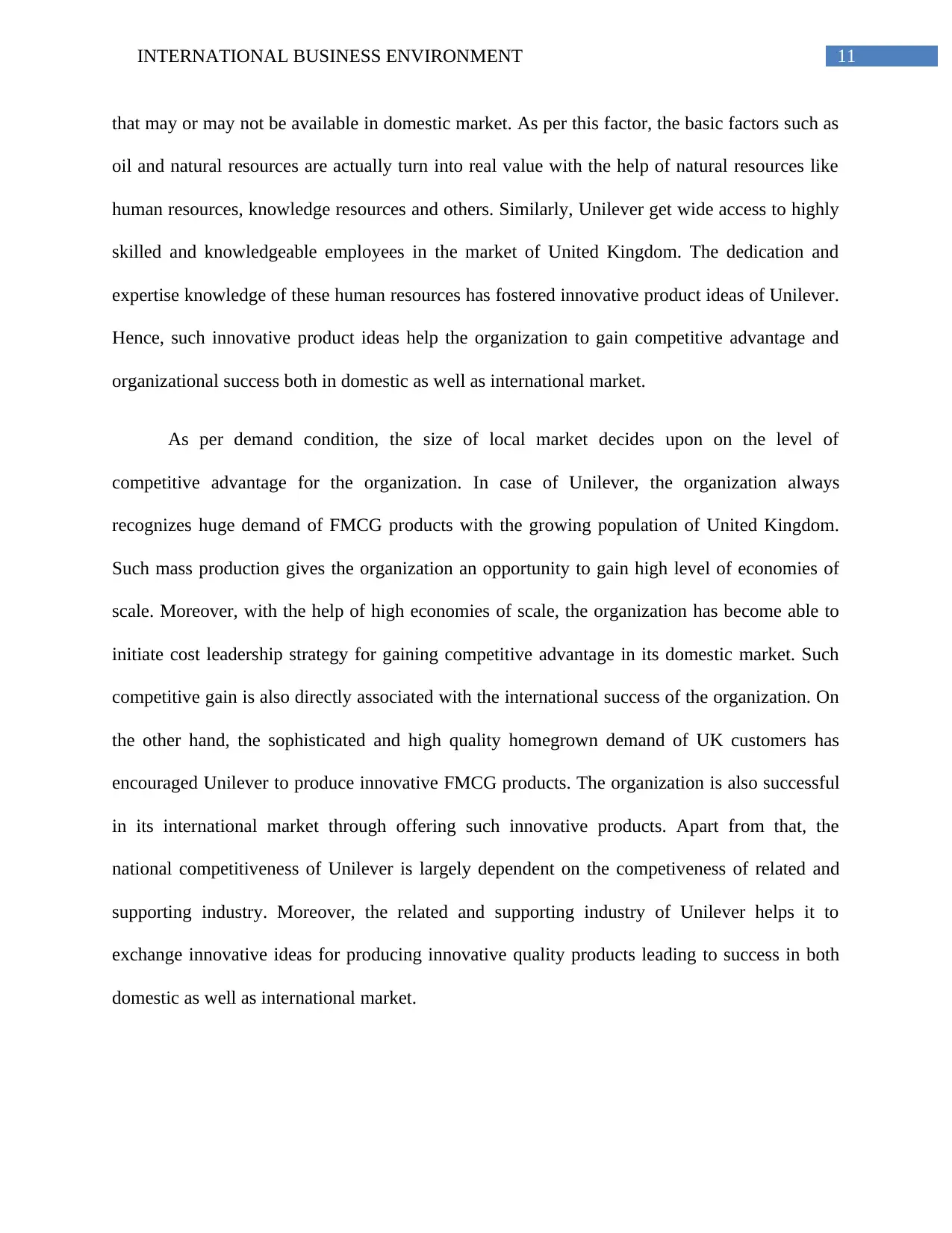
11INTERNATIONAL BUSINESS ENVIRONMENT
that may or may not be available in domestic market. As per this factor, the basic factors such as
oil and natural resources are actually turn into real value with the help of natural resources like
human resources, knowledge resources and others. Similarly, Unilever get wide access to highly
skilled and knowledgeable employees in the market of United Kingdom. The dedication and
expertise knowledge of these human resources has fostered innovative product ideas of Unilever.
Hence, such innovative product ideas help the organization to gain competitive advantage and
organizational success both in domestic as well as international market.
As per demand condition, the size of local market decides upon on the level of
competitive advantage for the organization. In case of Unilever, the organization always
recognizes huge demand of FMCG products with the growing population of United Kingdom.
Such mass production gives the organization an opportunity to gain high level of economies of
scale. Moreover, with the help of high economies of scale, the organization has become able to
initiate cost leadership strategy for gaining competitive advantage in its domestic market. Such
competitive gain is also directly associated with the international success of the organization. On
the other hand, the sophisticated and high quality homegrown demand of UK customers has
encouraged Unilever to produce innovative FMCG products. The organization is also successful
in its international market through offering such innovative products. Apart from that, the
national competitiveness of Unilever is largely dependent on the competiveness of related and
supporting industry. Moreover, the related and supporting industry of Unilever helps it to
exchange innovative ideas for producing innovative quality products leading to success in both
domestic as well as international market.
that may or may not be available in domestic market. As per this factor, the basic factors such as
oil and natural resources are actually turn into real value with the help of natural resources like
human resources, knowledge resources and others. Similarly, Unilever get wide access to highly
skilled and knowledgeable employees in the market of United Kingdom. The dedication and
expertise knowledge of these human resources has fostered innovative product ideas of Unilever.
Hence, such innovative product ideas help the organization to gain competitive advantage and
organizational success both in domestic as well as international market.
As per demand condition, the size of local market decides upon on the level of
competitive advantage for the organization. In case of Unilever, the organization always
recognizes huge demand of FMCG products with the growing population of United Kingdom.
Such mass production gives the organization an opportunity to gain high level of economies of
scale. Moreover, with the help of high economies of scale, the organization has become able to
initiate cost leadership strategy for gaining competitive advantage in its domestic market. Such
competitive gain is also directly associated with the international success of the organization. On
the other hand, the sophisticated and high quality homegrown demand of UK customers has
encouraged Unilever to produce innovative FMCG products. The organization is also successful
in its international market through offering such innovative products. Apart from that, the
national competitiveness of Unilever is largely dependent on the competiveness of related and
supporting industry. Moreover, the related and supporting industry of Unilever helps it to
exchange innovative ideas for producing innovative quality products leading to success in both
domestic as well as international market.
⊘ This is a preview!⊘
Do you want full access?
Subscribe today to unlock all pages.

Trusted by 1+ million students worldwide
1 out of 15
Related Documents
Your All-in-One AI-Powered Toolkit for Academic Success.
+13062052269
info@desklib.com
Available 24*7 on WhatsApp / Email
![[object Object]](/_next/static/media/star-bottom.7253800d.svg)
Unlock your academic potential
Copyright © 2020–2026 A2Z Services. All Rights Reserved. Developed and managed by ZUCOL.





